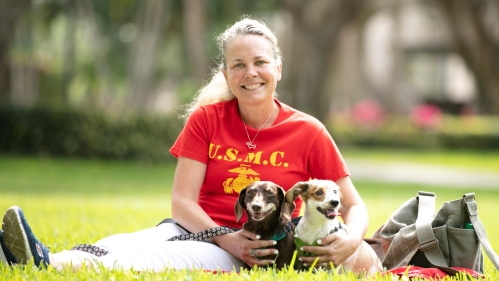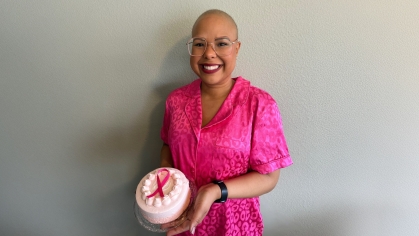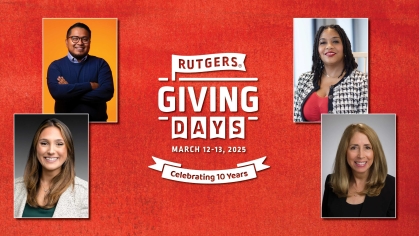A Leader in the Healing Science of Human-Animal Interaction

A Rutgers alumna and the School of Nursing’s 2025 convocation speaker, Cheryl Krause-Parello works on ways to enhance veterans’ well-being, one tail wag at a time.
In the months following 9/11, Cheryl Krause-Parello watched her husband David, a first responder and Marine veteran, come home at night, mentally and physically exhausted from his recovery efforts after the World Trade Center towers collapsed. To decompress, he would always sit next to their dachshund, Samantha.
“I would watch him quietly from a distance, and I felt like every time he petted her, he was petting away the stress and trauma he experienced each day,” says Krause-Parello, who will be the convocation speaker for her alma mater the Rutgers University School of Nursing, Rutgers Health, in Newark on May 21. “He bonded with her like nobody’s business. He saw horrific things. She saved him every night.”
Their relationship was a familiar subject to her. After completing her bachelor’s degree at Seton Hall University and her master’s at St. Peter’s University, Krause-Parello would go on to Rutgers–Newark to earn her doctor of philosophy in nursing research in 2007 studying human-animal interaction—how pets can help people with everything from loneliness to living longer—long before the concept was mainstream.
Inspired by her husband, she continued researching this connection through the lens of veterans, and in 2013 she created Canines Providing Assistance to Wounded Warriors, more commonly known as CPAWW, at Florida Atlantic University where she is now associate vice president for research.
The Vocation of Nursing Research

A self-proclaimed lifelong “helper,” Krause-Parello had pharmacists and a nurse in her immediate family. And a dachshund owner from the age of four, she cared for these dogs and grew up having a lot of empathy, she says.
“It was a natural progression for me to enter nursing as a caring profession and wanting to help others, whether it’s humans or animals,” she says.
In graduate school, one of her instructors ignited her passion for research. Concurrently, as a school nurse at a nearby high school, she had the opportunity to research teenage pregnancy awareness and prevention for her thesis.
Following her passion for research, she applied to the nursing doctoral program at Rutgers to continue researching teen pregnancy. But a jarring statement from her advisers made her reconsider.
“They told me you should be passionate about your topic since you’re going to be five-plus years working it,” she says. “I remember going home and looking at my little dog and asking myself, what am I passionate about? You! You're the one that’s going to get me through my Ph.D.”
Only a few nurses were researching what then was called “pet therapy.” So, Krause-Parello spent a lot of time in the library, reading and copying materials to support her dissertation hypothesis: that animals can be an alternative to human social support, and by lessening loneliness, can increase wellbeing.
When fall semester came and it was time to begin coursework, she told her advisers about her huge switch to an unheard-of topic in nursing.
“It was not mainstream like it is today, where it’s common to see people with service and emotional support animals,” she says.
The topic was met with some skepticism. But encouraged by her dissertation chair, then-associate professor Linda Flynn, who later became dean of the school and also had a relationship with a family dachshund, Krause-Parello persevered.
“Some were asking ‘Is this nursing? Is this really science?’” she says. “It didn't make a difference to me because I had found what I was passionate about.”
Since then, Krause-Parello has received numerous grants to support her research with a long-term goal of “implementing effective interventions to modulate long-term effects of PTSD on returning active-duty military and veterans, and to identify additional populations where this intervention can be effective.”
She also seeks to provide evidence to support changes in public policy, so service dogs are covered as a reimbursable medical expense for those recovering from a service-connected condition. Ultimately and simply, she wants to save lives.
“It’s a labor of love,” she says. “CPAWW is a success, and our research has provided evidence to show the biopsychosocial effects that animals have on humans, including reduced stress, anxiety, and depression, as well as improved social interaction, physical activity, and wellbeing.”
Krause-Parello says she is honored to be the convocation speaker to inspire the graduates, including the next generation of nurse researchers. One of her proudest moments was receiving the Outstanding Alumnus Award from the school’s alumni association.
She says she enjoys connecting with the school’s faculty, always asking if there is a place for her at the Rutgers table at the Friends of the National Institute of Nursing Research “NightinGala” and during the annual American Academy of Nursing Conference.
“I always attend the Rutgers reception and hang out with ‘my New Jersey people,’” she says. “I see a lot of folks I’ve known for years. I’m always happy to support give back to Rutgers.”

WE ARE YOU is an ongoing series of stories about the people who embody Rutgers University’s unwavering commitment to academic excellence, building community, and the common good.
SUPPORT NURSING
Please consider a gift to the Rutgers School of Nursing at Newark or New Brunswick.


